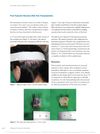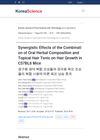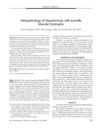 53 citations,
March 1987 in “Journal of The American Academy of Dermatology”
53 citations,
March 1987 in “Journal of The American Academy of Dermatology” Minoxidil effectively regrows hair in male pattern baldness.
 78 citations,
March 1987 in “Journal of The American Academy of Dermatology”
78 citations,
March 1987 in “Journal of The American Academy of Dermatology” Minoxidil promotes hair growth but stops working when discontinued.
 June 2007 in “Advances in Dermatology and Allergology/Postępy Dermatologii i Alergologii”
June 2007 in “Advances in Dermatology and Allergology/Postępy Dermatologii i Alergologii” Finasteride is effective in stopping hair loss and promoting regrowth in most men with mild side effects.
 July 2007 in “DOAJ (DOAJ: Directory of Open Access Journals)”
July 2007 in “DOAJ (DOAJ: Directory of Open Access Journals)” Female pattern hair loss, common in women, can be treated with oral antiandrogens and topical minoxidil, but these are more effective at preventing further loss than regrowing hair. Other helpful methods include counseling, cosmetic camouflage, and hair transplantation. Treatment must continue for effects to last and it may take up to 2 years to see results.
 January 2012 in “Current Therapy In Oral and Maxillofacial Surgery”
January 2012 in “Current Therapy In Oral and Maxillofacial Surgery” Endoscopic forehead and brow lifting safely and consistently improves aged eyebrows, but may have complications.
January 2013 in “프로그램북(구 초록집)” The Hair660™ light therapy device effectively and safely improves hair density in people with androgenetic alopecia.
 July 2014 in “Journal of Dermatology”
July 2014 in “Journal of Dermatology” Educating patients on phototrichogram increased satisfaction in androgenetic alopecia treatment.
 17 citations,
February 2019 in “PubMed”
17 citations,
February 2019 in “PubMed” Stem cells can help regenerate hair follicles.
10 citations,
August 2020 in “Dermatologic Surgery” Conditioned media from stem cells improves hair growth after laser treatment for hair loss.
November 2021 in “International Journal of Trichology” Trichoscopy is effective for diagnosing and monitoring female pattern hair loss.
 12 citations,
January 2016 in “Skin appendage disorders”
12 citations,
January 2016 in “Skin appendage disorders” Hair restoration surgery can potentially treat primary scarring alopecias, but it's important to start early medication, ensure patient remission before transplant, and monitor after surgery.
 July 2021 in “IntechOpen eBooks”
July 2021 in “IntechOpen eBooks” Ginseng, especially its component ginsenosides, can promote hair growth, reduce hair loss, and potentially treat conditions like alopecia by affecting cell pathways and cytokines.
 20 citations,
December 2013 in “Clinical and Experimental Dermatology”
20 citations,
December 2013 in “Clinical and Experimental Dermatology” Smoking and drinking worsened hair loss in men with genetic hair loss, while eating and sleeping habits didn't; genetics played a bigger role than environment in hair loss.
 8 citations,
July 2012 in “Cambridge University Press eBooks”
8 citations,
July 2012 in “Cambridge University Press eBooks” Androgens can both increase body hair and cause scalp hair loss.
 24 citations,
October 2012 in “Journal of Ginseng Research”
24 citations,
October 2012 in “Journal of Ginseng Research” Korean Red Ginseng may help improve hair regrowth when used with corticosteroid injections for Alopecia Areata.
 139 citations,
February 2014 in “Journal of Advanced Research”
139 citations,
February 2014 in “Journal of Advanced Research” Vitamin D is important for skin health and may affect conditions like psoriasis and hair loss, but more research is needed to understand its role fully.
 29 citations,
September 2014 in “American Journal of Dermatopathology”
29 citations,
September 2014 in “American Journal of Dermatopathology” Horizontal sections of scalp biopsies are good for diagnosing Central Centrifugal Cicatricial Alopecia and help customize treatment.
 1 citations,
August 2015 in “Dermatologic Surgery”
1 citations,
August 2015 in “Dermatologic Surgery” A woman's chronic head pain after hair transplant surgery was cured by removing a post-traumatic neuroma.
 1 citations,
April 2012 in “Korean Journal of Food Science and Technology”
1 citations,
April 2012 in “Korean Journal of Food Science and Technology” Using both oral herbal supplements and hair tonic together works better for hair growth than using just the tonic.
 8 citations,
January 2014 in “BioMed Research International”
8 citations,
January 2014 in “BioMed Research International” Eclipta alba extract was found to be effective in promoting hair growth in hairless mice.
 25 citations,
January 2013 in “Journal of Industrial and Engineering Chemistry”
25 citations,
January 2013 in “Journal of Industrial and Engineering Chemistry” Some herbal extracts, especially when used in cubosomal suspensions, were as effective as Minoxidil in promoting hair growth.
 25 citations,
November 2012 in “Phytotherapy Research”
25 citations,
November 2012 in “Phytotherapy Research” Crataegus pinnatifida extract may help increase hair growth and thickness in mice.
 39 citations,
July 2007 in “Archives of Pharmacal Research”
39 citations,
July 2007 in “Archives of Pharmacal Research” A tripeptide-copper complex may help hair grow by increasing cell growth and decreasing cell death.
 June 2023 in “Benha Journal of Applied Sciences”
June 2023 in “Benha Journal of Applied Sciences” People with chronic hair shedding have lower antioxidant levels in their blood compared to healthy individuals.
 5 citations,
January 2012 in “Hair therapy & transplantation”
5 citations,
January 2012 in “Hair therapy & transplantation” Hair mesotherapy might help with certain types of hair loss but lacks strong scientific proof and has some risks.
 19 citations,
May 2004 in “The American Journal of Dermatopathology”
19 citations,
May 2004 in “The American Journal of Dermatopathology” The research found that a specific gene mutation causes fewer hair follicles and disrupted hair growth cycles, leading to thin and short hair in people with Hypotrichosis with Juvenile Macular Dystrophy.
 115 citations,
June 2004 in “Pediatrics”
115 citations,
June 2004 in “Pediatrics” Children, especially teenagers, can get severe SARS-CoV infection with symptoms similar to adults, but they typically recover well with supportive care.
 50 citations,
May 2004 in “Journal der Deutschen Dermatologischen Gesellschaft”
50 citations,
May 2004 in “Journal der Deutschen Dermatologischen Gesellschaft” Estrogens generally inhibit hair growth and improve skin quality, but their exact effects on hair follicles are complex and not fully understood.
 18 citations,
March 2004 in “Clinics in Dermatology”
18 citations,
March 2004 in “Clinics in Dermatology” Lupus can cause hair loss and nail changes, with treatments available for both.
 February 2004 in “The New England Journal of Medicine”
February 2004 in “The New England Journal of Medicine” The book is a comprehensive resource on hair disorders, but lacks information on some conditions.



























